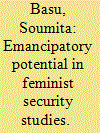|
|
|
Sort Order |
|
|
|
Items / Page
|
|
|
|
|
|
|
| Srl | Item |
| 1 |
ID:
126706


|
|
|
|
|
| Publication |
2013.
|
| Summary/Abstract |
Forum: The State of Feminist Security Studies: Continuing the Conversation. This forum comprises seven pieces conceived in response to the recent Politics & Gender Critical Perspectives section that featured contributions from Carol Cohn, Valerie Hudson, Jennifer Lobasz, Laura Sjoberg, Ann Tickner, Annick Wibben, and Lauren Wilcox (P&G 2011, Vol. 7, Issue 4). Throughout, we refer to this collection as "the CP section."
|
|
|
|
|
|
|
|
|
|
|
|
|
|
|
|
| 2 |
ID:
145273


|
|
|
|
|
| Summary/Abstract |
The United Nations Security Council has often been identified as a key actor responsible for the uneven trajectory of the international Women, Peace and Security (WPS) agenda. It is, however, the Council members—who also seek to advance their national interest at this intergovernmental forum—that are pivotal in the Council's deliberations and shape its policies. Yet, little attention has been paid to this aspect of deliberative politics at the Council in feminist scholarship on WPS. This article seeks to address this gap in the literature. It notes that gender has increasingly become part of foreign policy interests of UN member states, as evidenced by practices such as invocation of ‘women's rights’ and ‘gender equality’ in broader international security policy discourse. The article demonstrates that this national interest in gender has featured in WPS-related developments at the Security Council. Using specific illustrations, it examines three sets of member states: the permanent and non-permanent members as well as non-members invited to take part in Council meetings. The main argument of this article relates to highlighting member states’ interests underpinning their diplomatic activities around WPS issues in the Security Council, with the aim to present a fuller understanding of political engagements with UNSCR 1325, the first WPS resolution, in its institutional home.
|
|
|
|
|
|
|
|
|
|
|
|
|
|
|
|
| 3 |
ID:
155811


|
|
|
|
|
| Summary/Abstract |
South Asia has garnered much attention in international security scholarship and policymaking, not least due to the number of protracted armed conflicts in the region. Yet, the dominant discourse on regional security in South Asia fails to adequately capture the insecurities that undermine the everyday lives and livelihoods of a majority of South Asians. The article first interrogates this prevalent discourse to reveal the inadequacies of traditional state-centric regional security analysis in South Asia. Drawing on critical approaches to security, including concepts that have been developed in the region, it then offers a reconceptualization of regional security. A brief case study discussion on food insecurity is employed to develop, and demonstrate the relevance of, such an approach to identifying and addressing contemporary security imperatives in South Asia. In doing so, the article presents a critical approach to regional security that is deeply rooted in South Asian experiences.
|
|
|
|
|
|
|
|
|
|
|
|
|
|
|
|
| 4 |
ID:
152736


|
|
|
|
|
| Summary/Abstract |
The year 2015 marked the fifteenth anniversary of United Nations Security Council Resolution 1325 (2000) on Women and Peace and Security. This article analyzes the marginalization of the resolution’s prevention mandate in the theoretical and policy literatures. Our feminist analysis reveals that shortcomings in the policy arena are foreshadowed in conflict prevention scholarship. Conflict prevention research under-theorizes gender drivers of conflict, focusing excessively on cause/effect links at the expense of (gendered) structures of signification that make violence possible. Mirroring these gaps, the implementation of the conflict prevention mandate of 1325 fails to confront the war system and gendered forms of militarism and militarization. Nevertheless, the work of agencies and organizations outside the Security Council presents opportunities for long-term and systemic social transformation. We suggest that advancements in the protection and participation aspects of 1325 can strengthen its prevention mandate because together these provisions challenge the gender norms that are implicated in the occurrence, justification, and sustenance of violent conflicts.
|
|
|
|
|
|
|
|
|
|
|
|
|
|
|
|
|
|
|
|
|